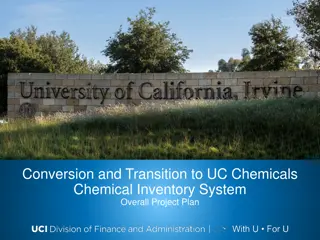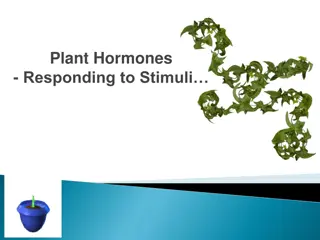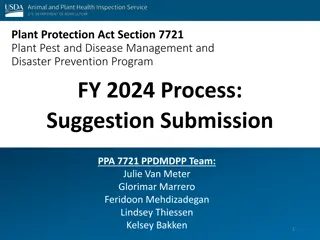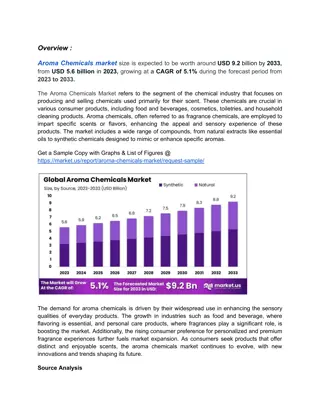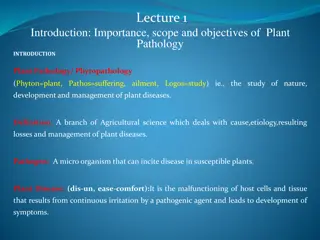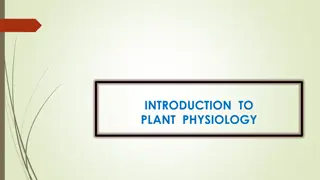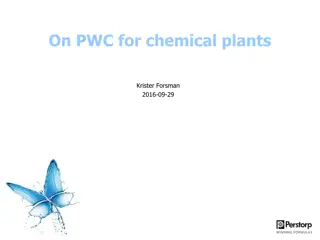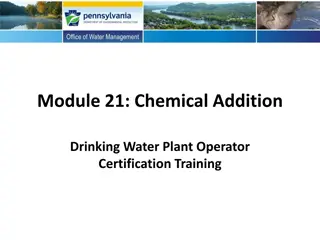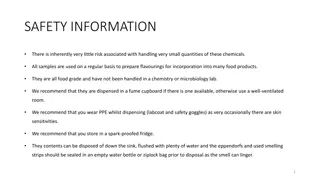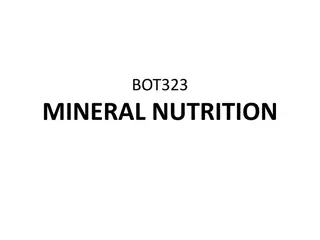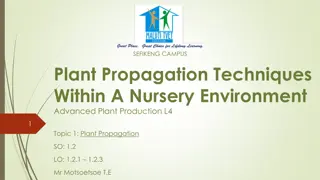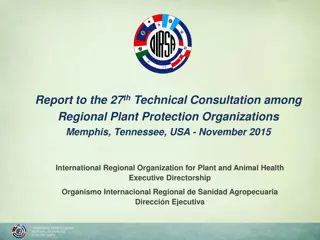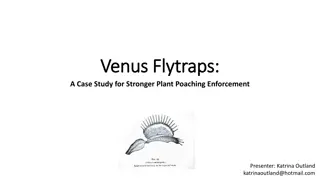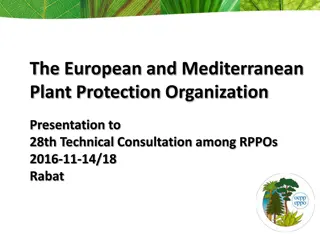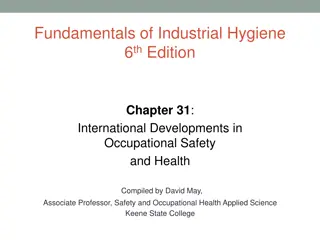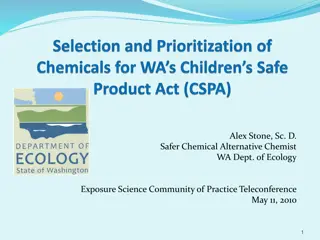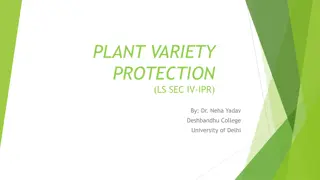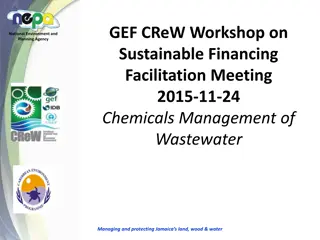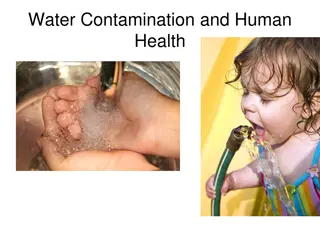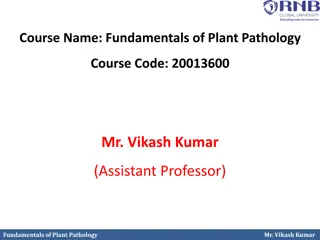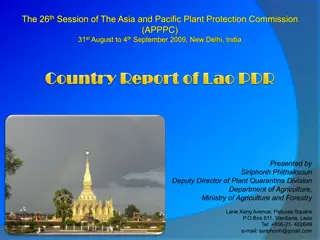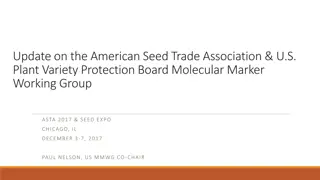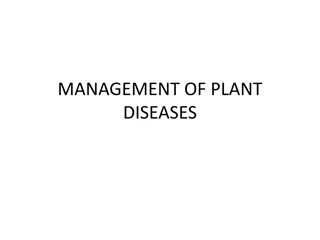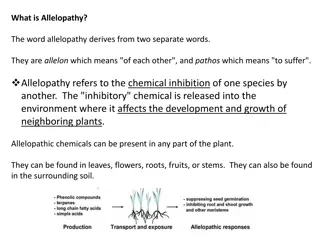Green Chemistry Chemicals Market Size Report, 2022-2029
The green chemicals market is expected to reach $217.18 billion by 2029 at a CAGR of 11.6% from 2022 to 2029. The growth of this market is driven by the scarcity of non-renewable resources, growing awareness regarding sustainable products, rising government initiatives to promote the use of green ch
2 views • 4 slides
Understanding Environmental Stress and Plant Management
Environmental stress, whether biotic or abiotic, can adversely affect plant growth and yield. Factors such as temperature extremes, waterlogging, radiation, chemicals, and pollution can lead to plant strains that may be reversible or permanent. Effective management of stress due to excessive moistur
8 views • 35 slides
Overview of Heavy Chemicals Manufacturing Process
The field of industrial chemistry involves the large-scale preparation of heavy chemicals, which are chemicals produced and used commercially. This process requires an understanding of various physico-chemical principles and specific manufacturing techniques for chemicals like Ammonia, Sulphuric Aci
1 views • 30 slides
Streamlining Chemical Inventory Management with UC Chemicals
This project plan focuses on transitioning existing chemical inventories into UC Chemicals system to address challenges with outdated information and database discrepancies. The UC Chemicals application offers real-time updates, assists first responders, and simplifies inventory reconciliation using
0 views • 21 slides
Understanding Plant Tissue Culture Media and Their Importance in In Vitro Growth
Plant tissue culture media play a crucial role in the in vitro growth and morphogenesis of plant tissues. The composition of culture media depends on the specific plant species and the type of material used for culture. Various types of media, such as White's medium, MS medium, B5 medium, N6 medium,
0 views • 6 slides
Understanding Plant Hormones and Their Role in Growth and Development
Plant hormones are essential chemicals that enable plants to respond to environmental stimuli, regulate growth processes like cell division and elongation, and control key developmental stages such as flowering and fruit development. Key hormones include auxin, gibberellins, and abscisic acid, each
0 views • 34 slides
Plant Protection Act Section 7721: Program Overview and Objectives
Explore the Plant Protection Act Section 7721 program aimed at plant pest and disease management. Learn about the six goal areas, objectives, and benefits for tribes and tribal organizations. Discover how to submit suggestions via the ServiceNow platform and access resources for FY2024 implementatio
0 views • 45 slides
Aroma Chemicals Market Expected to Soar with Surge in Organic and Natural Produc
Aroma Chemicals Market; By Source(Synthetic, Natural, Natural-Identical), By Products(Benzenoids, Terpenes and Terpenoids, Musk Chemicals, Others) (Ketones, Esters, Aldehydes), Application, Flavors, Convenience Foods, Confectionery, Dairy Products, B
0 views • 4 slides
Understanding Plant Pathology: Importance, Scope, and Objectives
Plant pathology, also known as phytopathology, is the study of plant diseases and their management. It covers the causes, symptoms, and impact of pathogenic organisms on plants. The field aims to understand the interactions between plants and pathogens, develop control methods, and reduce losses in
0 views • 6 slides
Introduction to Plant Physiology: Exploring the Functioning of Plants
Plant physiology is a crucial subdiscipline of botany that delves into the processes and functions operating within plants. This field closely examines areas like plant morphology, ecology, cell biology, and genetics, shedding light on vital processes such as photosynthesis, respiration, and more. T
1 views • 7 slides
Understanding Plant Stress and Management of Excessive Moisture
Environmental stress, both biotic and abiotic, can negatively impact plant growth. Factors like temperature, water, radiation, chemicals, pollution, and more can lead to strain in plants, affecting their development. Excessive moisture, particularly waterlogging, is a significant stressor that can r
0 views • 35 slides
Geomechanical Effects of Oilfield Chemicals on Sand Failure in Reservoir Rocks
This study by Elizabeth O. Wuyep et al. explores the geomechanical effects of oilfield chemicals on sand failure in reservoir rocks. It discusses the role of oilfield chemicals, limitations of previous works, experimental flow chart, and static saturation tests. The research emphasizes the need for
0 views • 25 slides
Insights into Specialty Chemicals Industry: Perstorp Plantwide Control
Explore the intricacies of specialty chemicals plants through the lens of Perstorp's experience, covering topics such as control objectives, degrees of freedom, and characteristics of these complex facilities. Discover the unique challenges and considerations in controlling processes for specialty c
0 views • 38 slides
Understanding Plant Tissue Culture: Techniques and Applications
Plant tissue culture involves maintaining and growing plant cells, tissues, or organs in artificial mediums under controlled conditions. It allows the regeneration of whole plants from small plant parts or cells. Hormones like auxins, cytokinins, and gibberellins are used in the process. Proper envi
3 views • 5 slides
Chemical Addition in Drinking Water Treatment Plant Certification Training
Learn about the essential topics of chemical addition in water treatment, including the types of chemicals used, safety measures, dosage calculations, and feed systems. Explore the importance of coagulating chemicals and their role in promoting particle aggregation for effective water treatment. Dis
0 views • 133 slides
Food Grade Chemical Handling Safety Information
Handling food-grade chemicals for flavor preparation requires minimal risk with proper precautions. The chemicals include 2,3-Pentanedione and Vanillin, commonly used in food products. Safety measures such as using a fume cupboard, wearing PPE, and proper disposal methods are recommended to ensure s
0 views • 7 slides
Plant Tissue Culture Methods for Growth and Reproduction Study
Plant tissue culture methods such as root tip culture, shoot-tip culture, leaf culture, flower culture, and anther and pollen culture allow for the study of growth, reproduction, and genetic variations in plants. These techniques involve culturing various plant parts under sterile conditions to inve
1 views • 20 slides
Understanding Plant Quarantine and Phytosanitary Measures
Plant quarantine involves efforts to prevent the entry, establishment, or spread of foreign pests through legal restrictions on plant and plant product movement. It is crucial for safeguarding plant health, food production, and ecosystems. Phytosanitary measures aim to ensure the health of plants by
0 views • 33 slides
Understanding Mineral Nutrition in Plants
Mineral nutrition in plants involves the acquisition of essential elements in the form of inorganic ions from soil, followed by their absorption and utilization in various plant processes. Around 60 different elements have been reported in plants, with 30 being essential for plant growth. These esse
0 views • 39 slides
Plant Propagation Techniques in Nursery Environment
Learn about plant propagation techniques within a nursery environment, including nursery operations, potting seedlings, plant protection, weed control, packing of nursery plants, and crafting tissues for plant growth. Explore the essential tasks involved in nurturing seedlings and trees before they
0 views • 17 slides
Understanding Allelopathy in Plants: History, Effects, and Significance
Allelopathy, the phenomenon of one plant affecting another through the release of chemicals, has a rich history dating back to ancient times. This article explores the origins of allelopathy, its role in plant interactions, types of allelochemicals, and their impact on plant growth and competition.
0 views • 25 slides
Plant Health Initiatives at the 27th Technical Consultation Among Regional Plant Protection Organizations - Memphis, Tennessee
The 27th Technical Consultation in Memphis, Tennessee focused on plant health initiatives by the International Regional Organization for Plant and Animal Health. OIRSA emphasized four key technical areas: plant health, animal health, agricultural quarantine, and food safety. Projects included addres
0 views • 13 slides
Plant Poaching Enforcement: A Case Study for Stronger Protection Laws
Understanding the importance of enforcing plant protection laws to combat illegal plant trade, this case study delves into the basics of poaching, the Lacey Act, challenges, and practical solutions. It discusses the global impact of plant poaching due to poverty and organized crime, highlighting the
0 views • 21 slides
European and Mediterranean Plant Protection Organization Overview
The European and Mediterranean Plant Protection Organization (EPPO) was established in 1951 and has grown to encompass 51 member countries across Europe, North Africa, the Mediterranean, and Central Asia. EPPO focuses on plant quarantine and protection products, with a dedicated team managing variou
0 views • 22 slides
Plant Growth Hormones and Defense Mechanisms: Understanding Plant Responses to the Environment
Plant growth hormones and defense mechanisms play crucial roles in how plants respond to environmental stimuli such as water, sunlight, gravity, and more. From auxins promoting cell growth to gibberellins stimulating flowering, this presentation educates on the intricacies of plant hormones and thei
1 views • 13 slides
Understanding Plant Hormones and Their Role in Growth and Development
Plant hormones are vital compounds that regulate various processes in plant growth and development. They are mostly organic and can be gases. These hormones are produced in one part of the plant and transported to other parts where they induce physiological effects. The main phytohormones include Au
0 views • 125 slides
Global Harmonized System of Classification and Labeling of Chemicals (GHS) Overview
The Global Harmonized System of Classification and Labeling of Chemicals (GHS) was developed to address the inconsistencies in hazard information for chemicals globally due to significant trade. The history, mandate, and provisions of GHS, along with additional domestic harmonization efforts, are di
0 views • 29 slides
Building a Comprehensive Chemical Inventory System
Conduct a thorough review of all processes to identify and document all chemicals used on-site, create a standardized inventory with relevant information, and use the inventory to prioritize hazardous chemicals for substitution, track usage quantities, and streamline purchasing practices to prevent
0 views • 7 slides
Regulation of Chemicals in Children's Products for Safety
Massive safety concerns arose in 2007 due to high lead levels in toys, leading to legislation like the Children's Safe Product Act in WA. The Act restricted lead, cadmium, and phthalates in children's products, with a focus on Chemicals of High Concern to Children (CHCCs). The implementation involve
0 views • 27 slides
Overview of Plant Variety Protection and International Treaties
Plant variety protection is essential for biodiversity and sustainable agriculture. Various international conventions and treaties such as CBD, UPOV, and TRIPs impact the legal framework for protecting plant varieties. The UPOV organization aims to safeguard plant breeders' rights separately from pa
0 views • 21 slides
Sustainable Management of Wastewater Chemicals in Jamaica
Wastewater management in Jamaica poses risks due to the use of chemicals that can harm public health and the environment. Proper treatment and disposal of wastewater chemicals are crucial to prevent long-term negative impacts. Addressing this issue requires a policy framework for sound chemical mana
0 views • 10 slides
Water Contamination and Human Health: Causes, Types, and Examples
Water contamination poses a significant risk to human health, caused by various pollutants such as microorganisms, chemicals, industrial wastes, and sewage. Common sources include human and animal sewage, industrial emissions, pesticides, and agricultural runoff. Different types of contaminants incl
0 views • 25 slides
Exploring the Fundamentals of Plant Pathology: Understanding Viruses in Plant Diseases
Delve into the world of plant pathology with Mr. Vikash Kumar, as you learn about the nature, structure, and transmission of viruses affecting plants. Explore the important characteristics of plant viruses, their unique properties, and how they interact within plant cells. Gain insights into viral d
0 views • 14 slides
Overview of Agricultural Departments and Plant Quarantine Division
The content discusses the various divisions and centers within the Department of Agriculture, including the Administration Division, Agronomy Management Division, and Plant Protection Center. It also touches on Plant Quarantine Division and the importance of entry/exit plant quarantine points in man
0 views • 18 slides
Advancements in Molecular Marker Utilization for Plant Breeding
Explore the latest developments in using DNA markers for plant breeding, focusing on applications such as marker-trait association, germplasm characterization, and seed purity. Learn how DNA markers are revolutionizing plant science by enhancing genomic prediction, facilitating varietal distinctness
0 views • 9 slides
Overview of Plant Quarantine and Disease Management
Plant quarantine is a crucial practice that involves regulating the movement of plants and plant products to prevent the spread of pests and diseases. Originating with the first law in France in 1860, plant quarantine now encompasses various methods such as embargoes and inspections to safeguard pla
0 views • 11 slides
Everything You Should Know About Chemical and Acid Resistant Heat Transfer Labels
Chemical resistant heat transfer labels are capable of withstanding direct contact with harsh chemicals. Coated with permanent adhesive that resists solvents and chemicals, they remain permanently adherent even when exposed to harsh chemicals and dur
0 views • 6 slides
Importance of Legislation in Plant Protection Efforts
Legislation plays a crucial role in implementing international obligations related to plant protection. Enacting national laws designates Competent Authorities, defines responsibilities, and provides the framework for public action. The IPPC requires contracting parties to integrate its provisions i
0 views • 13 slides
Understanding Allelopathy: Chemical Interactions Among Plants
Allelopathy involves the chemical inhibition of one plant species by another, affecting growth and development. Target species may suffer from reduced growth, nutrient uptake, and disrupted symbiotic relationships due to allelopathic chemicals present in different plant parts and soil. Certain plant
0 views • 4 slides
NAPPO Overview: Collaboration for Agricultural Protection
NAPPO, the North American Plant Protection Organization, provides a platform for collaboration among Canada, the United States, and Mexico to safeguard agricultural and plant resources while promoting safe trade. Through developing regional standards, conducting workshops, and engaging stakeholders,
0 views • 12 slides



